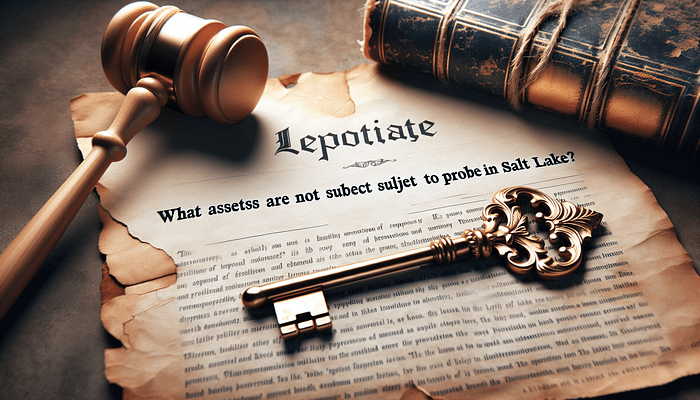What Assets Are Not Subject To Probate In Salt Lake?
Discover what assets can bypass probate in Salt Lake. Learn about trusts, joint ownership, beneficiary designations, and small estates. Save time and legal fees today!
What Assets Are Not Subject To Probate In Salt Lake?
Probate can be a daunting process when dealing with the estate of a loved one. Understanding what assets are not subject to probate in Salt Lake can help you navigate this challenging period with confidence and clarity. The probate process can be lengthy and complex, which makes it essential to identify assets that bypass this legal procedure. This article will provide comprehensive information on the types of assets that are exempt from probate, empowered by real Utah laws and statutes.

Understanding Probate in Utah
Probate is the judicial procedure through which a deceased person’s estate is settled. This involves validating the deceased individual’s will, inventorying their assets, paying off debts, and distributing the remaining assets to heirs. The Utah Code governs this process in specific ways that can significantly impact how an estate is managed.
Citing the Utah Code, Title 75, Chapter 3, probate procedures are clearly outlined to ensure an organized transition of assets. Assets that are subject to probate must adhere to these regulations, which can be both time-consuming and costly.
Why It Matters
Understanding which assets are not subject to probate can save time, reduce legal fees, and ensure a smoother transition of property to beneficiaries. By identifying and correctly managing these assets, you can avoid some of the common pitfalls associated with probate, such as lengthy court procedures and potential disputes. This knowledge empowers you to make informed decisions, ultimately protecting your rights and interests.
Types of Non-Probate Assets
Let’s delve into some key categories of assets that are generally exempt from probate in Salt Lake.
Jointly Owned Property
One of the simplest ways to bypass probate is through joint ownership with rights of survivorship. When an asset is jointly owned, it automatically transfers to the surviving owner upon the other owner’s death. This principle applies to various forms of property, including real estate and bank accounts.
In Utah, the law under Utah Code § 75–2–803 recognizes the right of survivorship in joint tenancy arrangements. This ensures that the surviving joint tenant becomes the sole owner of the asset without going through probate.
Beneficiary Designations
Certain financial accounts and insurance policies allow you to name a beneficiary, who will directly receive these assets upon your death. These designations are honored outside of probate proceedings.
Examples include:
- Life insurance policies
- Retirement accounts like IRAs and 401(k)s
- Payable-on-death (POD) bank accounts
- Transfer-on-death (TOD) investment accounts
The Utah Code recognizes these beneficiary designations, allowing the designated individuals to claim the proceeds directly without involving probate courts.
Trusts
Assets held in a living trust are another effective method for avoiding probate. When you establish a trust, you transfer ownership of your assets to the trust itself, administered by a trustee you designate. Upon your death, the trustee manages and distributes the assets according to your instructions.
According to Utah Code § 75–7, trusts are subject to their own set of rules, which means assets within them do not require probate to be transferred to beneficiaries.
Small Estates
Utah law provides a simplified probate process for certain small estates. Under Utah Code § 75–3–1201, if the total value of the estate’s personal property is below a specified threshold, heirs may collect these assets using an affidavit, bypassing traditional probate procedures.
As of current regulations, this threshold is $100,000. This means if the deceased’s personal property is valued below this amount, the heirs can use a simple legal procedure to claim these assets without formal probate.
Property Held in Community Property with Right of Survivorship
In a marriage or domestic partnership, spouses may hold assets as community property with right of survivorship. Under this arrangement, the surviving spouse automatically receives the deceased spouse’s share of the property, bypassing probate entirely. While not traditionally common law in Utah, agreements can be set up to align with this concept.
How Laws Protect Rights and Resolve Disputes
Various laws in Utah are designed to protect the rights of all parties involved in the probate process, facilitating a fair and orderly settlement of the deceased’s estate. These laws also provide mechanisms to resolve disputes that may arise during asset distribution.
Utah Code § 75–1–201 outlines the responsibilities and powers of personal representatives (executors), ensuring they act in the estate’s best interest and adhere to legal stipulations. If disputes occur, such as contested wills or disagreements about asset distribution, courts can intervene to provide a resolution.

Common Misconceptions About Probate
Misconception #1: All Wills Must Go Through Probate
While it is common for wills to go through probate, certain assets (like those mentioned earlier) can bypass this process if they are correctly structured before death.
Misconception #2: Probate Is Always Lengthy and Expensive
With adequate planning, probate can be simplified or even avoided for many assets, making the process quicker and less costly. Utilizing tools like trusts and beneficiary designations can significantly streamline estate settlement.
Misconception #3: Only Large Estates Require Probate Planning
Even small estates can benefit from probate planning, particularly to save time and reduce administrative burdens on surviving loved ones.
Practical Applications and Scenarios
Here’s a practical scenario to illustrate how probate and non-probate assets work in Salt Lake:
Imagine Sarah, a Salt Lake resident, owns a home worth $400,000 jointly with her husband, Bob. They also have a savings account worth $50,000, where they have named each other as beneficiaries. Sarah has a life insurance policy worth $200,000, listing Bob as the primary beneficiary.
Upon Sarah’s sudden passing:
- The home transfers automatically to Bob through joint tenancy with right of survivorship, avoiding probate.
- The savings account also transfers directly to Bob through the beneficiary designation, avoiding probate.
- The life insurance policy payout goes straight to Bob, bypassing probate.
However, any other assets Sarah owned solely in her name without a designated beneficiary would likely go through the more traditional probate route.
FAQs
1. What happens if there is no will?
If someone dies without a will, the estate is considered “intestate.” In Utah, intestate succession laws (found in Utah Code § 75–2–101) determine how the estate is distributed, prioritizing close relatives such as spouses and children.
2. Can I avoid probate entirely?
Yes, with proper planning and legal structuring, many assets can be set up to bypass probate. Trusts, joint tenancy, and beneficiary designations are effective means to achieve this.
3. What is the role of a probate lawyer?
A probate lawyer assists in navigating the probate process, from filing necessary paperwork to resolving disputes and ensuring the estate is settled according to legal requirements. Speaking with a probate lawyer can provide personalized guidance tailored to your estate’s specifics.
4. Are digital assets subject to probate?
Digital assets can be subject to probate unless explicitly stated otherwise in legal documents like wills or trusts. It’s crucial to include provisions for digital assets in your estate planning.
5. How long does the probate process take?
The duration of the probate process can vary depending on the estate’s complexity, but it typically ranges from several months to over a year. Proper planning can expedite the process for certain assets.
Conclusion
Understanding which assets are subject to probate in Salt Lake can save you significant time, reduce legal fees, and provide clarity during a challenging time. Proper planning, utilizing tools like joint ownership, trusts, and beneficiary designations, can play a crucial role in easing the estate settlement process for your loved ones.
To speak with a probate lawyer, call attorney Jeremy Eveland at (801) 613–1472.
Don’t forget to clap if you enjoyed this article, leave a comment with your thoughts, and subscribe to our Medium newsletter for more updates! Jeremy Eveland 8833 S Redwood Rd West Jordan Utah 84088 (801) 613–1472
The information contained in this article is for information purposes only and is not legal advice. For legal advice, hire a competent lawyer in your jurisdiction.
